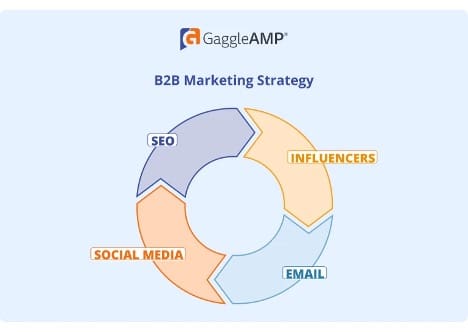In the rapidly evolving digital landscape, businesses must continually adapt and innovate their marketing strategies to stay competitive. In 2024, several key strategies stand out as essential for driving success. These include Search Engine Optimization (SEO), Link Building, Email Marketing, B2B Cold Calling, and a few other supporting tactics. Let’s dive deeper into each of these strategies.


Search Engine Optimization (SEO)
SEO remains a cornerstone of digital marketing. In 2024, it’s more critical than ever due to the increasing volume of online content and the evolving algorithms of search engines like Google.
Key Components of SEO:
- Keyword Research and Optimization: Identify high-value keywords that your target audience uses. Use tools like Google Keyword Planner, Ahrefs, or SEMrush to find relevant keywords. Integrate these keywords naturally into your website content, including titles, meta descriptions, headers, and body text.
- Quality Content Creation: Content remains king. Create high-quality, engaging, and informative content that addresses the needs and questions of your audience. This not only helps with ranking but also builds authority and trust.
- Technical SEO: Ensure your website is technically sound. This includes optimizing site speed, ensuring mobile-friendliness, improving site architecture, and using schema markup to help search engines understand your content.
- User Experience (UX): Google’s algorithms increasingly favor websites that offer a great user experience. This means easy navigation, clear calls to action, and engaging accessible content.
Link Building
Link Building is a critical part of SEO that focuses on acquiring hyperlinks from other websites to your own. These links are like votes of confidence and can significantly boost your search engine rankings.
Effective Link-Building Strategies:
- Guest Blogging: Write valuable articles for reputable blogs in your industry. Ensure your bio or content includes a link back to your website.
- Content Marketing: Create high-quality, shareable content such as infographics, research reports, and comprehensive guides. If your content is valuable, other websites will naturally link to it.
- Broken Link Building: Find broken links on other websites and offer your content as a replacement. This not only helps webmasters fix issues but also earns you a valuable backlink.
- Influencer Outreach: Collaborate with influencers and industry leaders. Their endorsements and links can drive traffic and boost your site’s authority.
Email Marketing
Email Marketing continues to be one of the most effective digital marketing strategies. It allows for direct communication with your audience, nurturing leads, and converting prospects into customers.
Best Practices for Email Marketing:
- Segmentation and Personalization: Segment your email list based on criteria like behavior, demographics, or purchase history. Personalize your emails to make them more relevant to each segment.
- Automated Email Sequences: Use automation tools to send timely and relevant emails based on user actions. For example, send a welcome series to new subscribers or follow-up emails after a purchase.
- Engaging Content: Create compelling subject lines and valuable content. Use a mix of educational, promotional, and transactional emails to keep your audience engaged.
- Mobile Optimization: Ensure your emails are optimized for mobile devices, as a significant portion of users will read emails on their smartphones.


B2B Cold Calling
While often considered an old-school tactic, B2B Cold Calling remains effective in specific industries, particularly when combined with modern data-driven techniques.
Enhancing B2B Cold Calling:
- Research and Targeting: Use data and analytics to identify potential leads who are most likely to be interested in your product or service. Tailor your approach based on the prospect’s industry, company size, and specific needs.
- Personalized Pitches: Avoid generic scripts. Personalize your pitch to address the unique challenges and needs of each prospect. This shows you’ve done your homework and understand their business.
- Follow-Up Strategy: Persistence is key. Develop a follow-up strategy that includes multiple touchpoints, such as follow-up calls, emails, and LinkedIn messages.
- Value Proposition: Clearly communicate the value your product or service brings to the prospect’s business. Focus on how you can solve their specific problems or help them achieve their goals.
- Social Media Marketing
In addition to the above strategies, Social Media Marketing remains crucial in 2024. Platforms like LinkedIn, Twitter, Facebook, and Instagram offer unique opportunities to connect with your audience, build brand awareness, and drive traffic.
Social Media Marketing Tactics:
- Platform Selection: Choose the right platforms based on your target audience. For B2B businesses, LinkedIn and Twitter might be more effective, while B2C businesses might find greater success on Instagram and Facebook.
- Content Strategy: Develop a content calendar that includes a mix of promotional, educational, and engaging content. Use multimedia such as videos, infographics, and live streams to capture attention.
- Community Engagement: Actively engage with your audience by responding to comments, participating in discussions, and joining relevant groups. This helps build a loyal community around your brand.
- Paid Advertising: Utilize paid advertising options to reach a broader audience. Platforms offer various targeting options, allowing you to reach specific demographics, interests, and behaviors.
Integrating the Strategies for Maximum Impact
To maximize the impact of these digital marketing strategies, it’s essential to integrate them effectively:
- Cross-Channel Consistency: Ensure consistent messaging and branding across all channels. Your SEO efforts should align with your content marketing, and your email campaigns should reflect your social media messaging.
- Data and Analytics: Use data to measure the performance of each strategy. Tools like Google Analytics, SEMrush, and social media insights can provide valuable data on what’s working and what’s not.
- Continuous Optimization: Digital marketing is not a set-and-forget strategy. Continuously analyze your results, conduct A/B testing, and optimize your tactics based on performance data.
Conclusion
Success in digital marketing in 2024 requires a multifaceted approach that leverages SEO, link building, email marketing, B2B cold calling, and social media marketing. By focusing on these strategies and integrating them effectively, businesses can enhance their online presence, engage their audience, and drive significant growth. Adaptation, innovation, and a data-driven mindset will be key to navigating the ever-changing digital landscape and achieving marketing success in the coming year.









Leave a Reply
View Comments